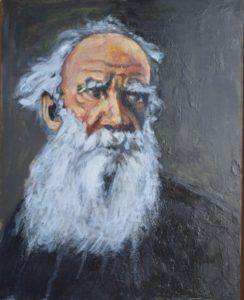Leo Tolstoy Archive
Written: 1908
Source: From RevoltLib.com
Transcription/Markup: Andy Carloff
Online Source: RevoltLib.com; 2021

After that, Jesus began to convey to all the people in parables how they should understand the kingdom of God. The first parable he told was this. After a man sown seeds in his field, he is not thinking about them, and sleeps at night, and rises during the day, and does his work without worrying about how the seeds come up and grow. The seeds by themselves get swollen, sprout, turn to greens, grow to tube, to ear, ripe grain. And only when the harvest is ready, the master sends reapers to harvest the grains. The same way God does to establish the kingdom of God among people by force, but entrusted the people themselves to do this.
The second parable Jesus told was that if there is no kingdom of God within a person, then God will not accept such person into His kingdom, but leaves him in the world until the person himself becomes worthy of the kingdom of God. He said: - “The kingdom of God is like when a fisherman throws a fishnet into the sea and captures all kind of fish; having captured fish, he selects those which are wanted and releases the unwanted ones back into the sea.” And he told even the third parable about this. A master sowed good seeds into his field. And the seeds began to grow, and bad grass grew among them as well. And the workers came to the master and said, ‘Have you not planted bad seeds? You have a lot of bad grass in your field. Send us there, we'll weed them off.’ And the master says: ‘Don’t need to, because if you will start to weed the grass off, you will trample the wheat. Let them grow together. When harvest will come, then I will order the reapers to harvest the wheat, and to throw the bad grass away. The same way, God does not allow people to meddle with the lives of other people, neither does has he meddle himself. Everyone can come to God only by himself, by his own efforts. (Matthew 4, 26-29; Matthew 13, 47, 48, 24-30)
Questions:
1) What did Jesus convey to people in parables?
2) What was the 1st parable about?
3) What was the 2nd parable about?
4) What was the 3rd parable about?